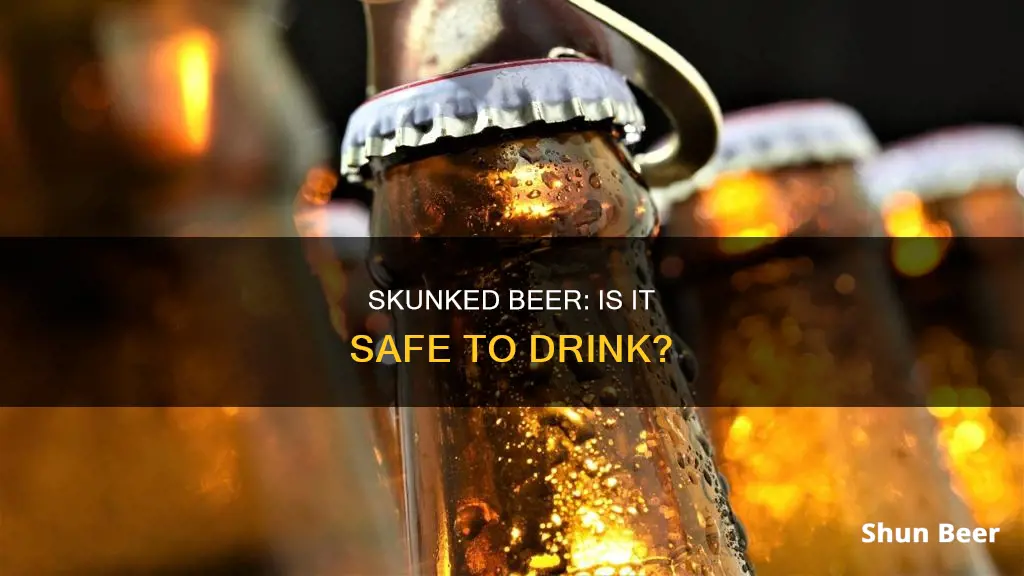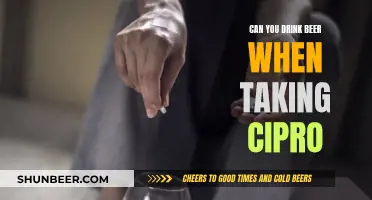
Skunked beer is caused by exposure to UV rays, which results in an unmistakable skunk-like smell and a wet cardboard flavor. The process is also known as lightstruck. Only bottled beer can be skunked, with clear glass bottles being the most susceptible, followed by green glass bottles, and brown glass bottles being the least likely to be affected. The chemical reaction triggered by UV rays causes the breakdown of iso-alpha acids, which then bind with sulfur-containing proteins, creating a compound that is almost identical to the one released by skunks. This compound can be detected by humans in extremely low concentrations, significantly altering the taste of the beer.
| Characteristics | Values |
|---|---|
| What is skunked beer? | Beer that's been compromised by exposure to UV rays. |
| What does skunked beer taste like? | Skunked beer has a distinctive "skunk" aroma and a wet cardboard flavor. |
| What causes the skunked taste in beer? | Exposure to light triggers a specific chemical reaction in the beer. |
| What type of beer bottles are most susceptible to skunking? | Clear glass bottles are the most susceptible to skunking, while green glass bottles are more vulnerable than brown bottles. |
| Does refrigeration affect the skunked taste? | Moderate temperature changes do not affect the flavor of beer. However, extreme temperature changes can make beer stale by increasing the rate of oxidation. |
What You'll Learn

What does skunked beer taste like?
Skunked beer is caused by exposure to UV rays, which can only reach the beer through glass bottles. The UV rays cause a chemical reaction with certain compounds produced by hops, resulting in an unmistakable aroma of "skunk".
The taste of skunked beer has been described as "skunky or rubbery" by Randy Mosher in his guide, *Tasting Beer*. The Cicerone program describes the taste as "musty, can be similar to burnt rubber or cat musk". Some people have also described it as similar to "body odour combined with burnt popcorn, sour coffee, or certain strains of aromatic marijuana".
The taste of skunked beer can vary depending on the type of beer and the extent of its exposure to UV rays. However, the general consensus is that it has an unpleasant, skunk-like taste that is not desirable in any style of beer.
If you want to experience the taste of skunked beer for yourself, you can try leaving a bottle of beer in a sunny place for a couple of days. However, it is important to note that drinking skunked beer may not be a pleasant experience and is generally not recommended.
Beer and Amnesteem: Is It Safe to Drink Alcohol?
You may want to see also

What causes beer to become skunked?
Skunked beer is caused by exposure to UV rays or, more specifically, blue spectrum and ultraviolet light. This exposure triggers a chemical reaction in the beer, which results in an unmistakable skunk-like aroma and bitter taste. The technical term for this process is "lightstruck".
The reason why only bottled beer can be affected by skunking is that UV rays can only reach the beer through glass bottles. Brown bottles offer the best protection against UV rays, while green bottles are more susceptible, and clear glass bottles are the most likely to result in skunked beer.
The chemical reaction that occurs when beer is skunked involves the sun's rays interacting with certain compounds produced by hops, called isohumulones or iso-alpha acids. This interaction causes the creation of a compound called 3-MBT, which gives off the skunk flavour and aroma.
The process of skunking can happen rapidly, so it is important to keep beer out of direct sunlight, especially if it is in a green or clear glass bottle.
Beer and TB Testing: What You Need to Know
You may want to see also

How to prevent beer from getting skunked
Skunked beer is a term used for beer that has been compromised by exposure to UV rays. This can be prevented by keeping the beer away from direct sunlight and storing it in a cool, dark place. Here are some detailed tips on how to prevent beer from getting skunked:
Choose the Right Container
The type of container you use to store your beer can make a big difference in preventing it from getting skunked. Beer stored in brown bottles is less likely to be affected by UV rays compared to green or clear glass bottles. If you want to be extra cautious, consider using aluminum cans, as they are even better at blocking out light.
Keep it Cool and Dark
Even if you choose the right container, it's important to store your beer in a cool, dark place. Keep the beer away from direct sunlight and heat sources, and make sure the storage area is well-ventilated to prevent temperature fluctuations. The cooler and darker the storage conditions, the less likely your beer will be affected by UV rays.
Minimize Exposure to Light
It's not just direct sunlight that can cause beer to skunk. Even indoor lighting can contribute to the problem over time. If you're storing beer for an extended period, consider using a light-blocking container or covering it with a dark cloth to minimize its exposure to light. This is especially important if you're using clear or green glass bottles.
Keep the Cooler Lid Shut
If you're storing your beer in a cooler, make sure to keep the lid shut as much as possible. This will not only help to regulate the temperature but also prevent light from entering and potentially skunking your beer. Remember that even brown glass bottles can let in enough light over time to cause skunking, so minimizing light exposure is crucial.
Be Mindful of Storage Duration
Even with the best storage practices, beer can still eventually skunk if stored for too long. Try to consume your beer within a reasonable period, and check the expiration date to ensure it's still safe to drink. The longer beer is stored, the higher the chances of skunking or other forms of spoilage.
By following these tips, you can significantly reduce the chances of your beer getting skunked and ensure that it stays fresh and tasty for longer. Remember, proper storage conditions are key to preserving the quality of your favorite brew.
Workplace Attire: Beer Shirts, Appropriate or Not?
You may want to see also

Beer bottles and their protection against skunking
Beer bottles are susceptible to skunking, a process by which beer is compromised by exposure to UV rays. The technical term for this process is "lightstruck". Skunked beer will have an unmistakable skunk-like aroma, which may put off drinkers. This process only occurs in bottled beer, as UV rays can reach the beer through glass bottles.
The level of protection a beer bottle offers against skunking depends on its colour. Brown bottles offer the best protection against UV rays, while green bottles are more susceptible to letting UV rays through, and clear glass bottles offer the least protection. The choice of bottle colour is often dictated by marketing and branding decisions, with many breweries opting for green or clear glass bottles.
To prevent beer from skunking, it is recommended to keep it out of direct sunlight, especially if it is in a green or clear glass bottle. Incandescent bulbs and modern CFL bulbs mostly give off infrared light and visible spectrum light, respectively, which are less likely to cause skunking. However, they may still emit some UV light, so it is best to avoid prolonged exposure.
In summary, while brown bottles offer the most protection against skunking, the choice of bottle colour is often influenced by branding and marketing considerations. To minimise the risk of skunking, it is best to keep beer bottles out of direct sunlight and avoid prolonged exposure to incandescent or CFL bulbs.
Beer and Steroids: A Dangerous Mix?
You may want to see also

Is drinking skunked beer harmful?
Skunked beer is caused by a specific chemical reaction triggered by exposure to UV light. The process is also known as "lightstruck". When a skunked bottle of beer is opened, an unmistakable aroma of "skunk" is released, which may put you off drinking it. The reaction can happen fairly rapidly, especially with beer in green or clear glass bottles.
So, is drinking skunked beer harmful? Well, it's certainly not pleasant, but it's also not dangerous. The only potential issue is if you have an allergy or sensitivity to the compounds produced by the reaction, in which case you could experience some minor stomach upset or discomfort. However, for most people, the biggest risk is an unpleasant taste in your mouth and an offensive odour in your nose.
The chemical reaction that causes skunked beer involves the breakdown of iso-alpha acids, which are derived from hops, by UV light. This results in the creation of a compound called 3-MBT, which gives off the distinctive skunk flavour and odour. While this compound is safe to consume, it's definitely not the most appealing flavour for beer drinkers.
To avoid drinking skunked beer, it's best to avoid beer in green or clear glass bottles, as these are more susceptible to UV light. Beer in brown bottles is less likely to be affected, as the dark glass blocks out most of the UV rays. Cans are also a good option, as they completely block out the light. Additionally, try to keep your beer out of direct sunlight and avoid extreme temperature changes, as these can also affect the flavour and quality of the beer.
So, while drinking skunked beer is not inherently harmful, it's definitely an unpleasant experience that's best avoided. By taking some simple precautions, you can ensure that your beer stays fresh and tasty.
Beer and Lipitor: Safe Mix or Health Risk?
You may want to see also
Frequently asked questions
Skunked beer is beer that has been exposed to UV rays, which causes a chemical reaction that gives the beer a distinctive "skunk" aroma and an unpleasant taste.
Exposure to sunlight or store display lights can cause beer to become skunked. The UV rays break down the iso-alpha acids in the hops, which then bind with sulfur-containing proteins, creating a new chemical compound that is almost identical to the one released by skunks.
To prevent beer from becoming skunked, keep it out of direct sunlight and store it in a cool, dark place. Brown bottles are the most effective at blocking UV rays, so choosing beer packaged in brown bottles can also help prevent skunking.
While it may not taste very pleasant, drinking skunked beer is not dangerous and is unlikely to cause any harm. However, if the beer has an extremely unpleasant taste or smell, it may be best to discard it.







